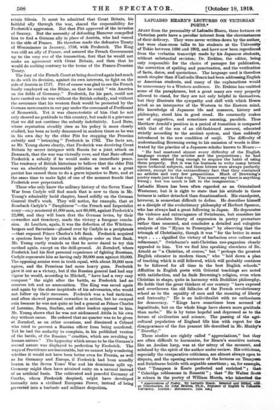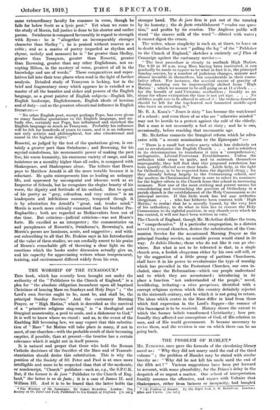LAFCADIO HEARN'S LECTURES ON VICTORIAN POETS.*
APART from the personality of. Lafeadio Hearn, these lectures on Victorian poets have a peculiar interest from the circumstances of their delivery. They were never written down by the• author,
but were class-room talks to his students at the University of Tokio between 1896 and 1902, and have now been reproduced• from the verbatim transcript made by his Japanese students, without substantial revision; Dr. Erskine, the editor, being only responsible for the choice of passages for publication, the correction of spelling and punctuation, and the verification of facts, dates, and quotations. The language used is therefore much simpler than if Lafcadio Hearn had been addressing English or American students, and many of the explanations would be unnecessary to a Western audience. Dr. Erskine has omitted some of the paraphrases, but a great many are very properly allowed to stand, for they are not only helpful in themselves, but they illustrate the sympathy and skill with which Hearn acted as an interpreter of the Western to the Eastern mind. His knowledge of Japanese life and manners, history and philosophy, stood him in good stead. He constantly makes use of suggestive, and sometimes amusing, parallels. Thus Matthew Arnold's position in a period of transition is compared
with that of the son of an old-fashioned samurai, educated strictly according to the ancient system, and then suddenly introduced to the new condition of meiji. The difficulty of
understanding Browning owing, to his omission of words is illustrated by the practice of a Japanese scholar known to Ream :—
" He hadmastered almost every difficulty of the English language except thearticles and the prepositions ; he had never been abroad long enough to acquire the habit of using them-properly. But it was his business to write many letters upon technical subjects, and these letters were always perfectly correct, except for the extraordinary fact that they contained no articles and very few prepositions. Much of Browning's poetry reads just in that way. You cannot say there is anything wrong ; but too much is left to the imagination."
Lafoadio Hearn has been often regardedas an Orientalized Westerner, but it is right to state that his attitude in these lectures is rather detached than denationalized. His standpoint, however, is somewhat difficult to define. He describes himself as a. disciple of the evolutionary philosophy of Herbert Spencer, who has always had a great following in Japan. He deprecates the violence and extravagance of Swinburne, but considers his plea for absolute liberty of expression in poetry premature rather than unsound, and concludes a detailed and eulogistic analysis of the " Hymn to Proserpina" by observing that the
triumph of Christianity, though it was " for the better in some ways . . . . signifiedthe victory of barbarism over culture and
refinement." Swinburne's anti-Christian neopaganism clearly appealed to him. Yet we find him speaking elsewhere of Dr. Arnold as " a Christian, of course," but " perhaps the greatest
English educator inmodern times," who " laid down a plan of teaching which is still followed, which will probably continue to be followed for all time in the best English schools." Affinities in English poets with Oriental teachings are noted with satisfaction, and he finds Browning's religion, evert when. Christian in shape, quite in harmony with Buddhist philosophy. He holds that the great thinkers of our century " have exposed and overthrown the old fallacies of the French revolutionary school as to the equality of men• and the meaning of liberty
and fraternity." He is an individualist with no enthusiasm for democracy. " Kings have sometimes• been accused ' of ingratitude, but on the whole kings have shown more gratitudethan mobs." He is by tarns hopeful and depressed as to the future of civilization and science. The passing of the agricultural population of England fills him with regret for the disappearance of the fine peasant life described in Mr. Munby-its " Dorothy."
These studies are rightly called " appreciations," but they are often difficult to harmonize, for Hearn's sensitive naturta
like an Aeolian harp, was at the' mbrcy of the moment, and subdued by the spirit of the author under review. His criticisms,
especially the comparative criticisms, are almost always open to dispute, and the opening sentences of the lectures on Tennyson and Swinburne bristle with arguable assertions ; as, for example,
that " Tennyson is Keats perfected and enriched " ; that " Coleridge reblossoms in Rossetti " ; that " Sir Walter Seobb is reborn in the poetry of William Morris, who inherited. the, • Aprvoiations of Poetry. By Lafeadio Hearn. Selected and Edited, with an Introduction, by John Erskine, Ph.D., Profossor of English in Columbia University. London : Heinemann, Ms. net.}
same extraordinary faculty for, romance in verse, though he falls far below Scott as a lyric poet." Yet when we come to the study of Morris, full justice is done to his shorter and earlier poems. Swinburne is compared favourably in regard to strength with Byron : he is " altogether an incomparably stronger character than Shelley " ; he is praised without reserve as a critic ; and as a master of poetry (regarded as rhythm and rhyme, melody and measure) he is "far greater than Shelley, greater than Tennyson, greater than Rossetti, greater than Browning, greater than any other Englishman, not ex cepting Milton, in the mastery of verse, greatest of all in the knowledge and use of words." These comparatives and super latives fall into their true places when read in the light of further analysis. Detailed study of Tennyson is lacking, but in the brief and fragmentary essay which appears he is extolled as a master of all the beauties and riches and powers of the English language, as a great painter of English subjects—English life, English landscape, Englishwomen, English ideals of heroism • and of duty—and as the greatest educational influence in English literature :—
" No other English poet, except perhaps Pope, has ever given so many familiar quotations to the English language, and nobody else, certainly not Pope, has influenced and enriched the English language so much as Tennyson. Probably his influence will be felt for hundreds of years to come, and it is an influence not only artistic and philosophical, but also educational and moral in the highest degree."
Rossetti, as judged by the test of the quotations given, is cer
tainly a greater poet than Swinburne ; and Browning, for his myriad-mindedness, his necromantic power of making the past live, his warm humanity, his enormous variety of range, and his insistence on a morality higher than all codes, is compared with Shakespeare, and Shakespeare alone. The tribute that Hearn pays to Matthew Arnold is all the more notable because it is reluctant. He quite misrepresents him as leading an unhappy life, and oppressed by uncongenial and irksome work as an Inspector of Schools, but he recognizes the elegiac beauty of his verse, the dignity and fortitude of his outlook. But to speak of his poetry as " grey, colourless, and very curious " is an inadequate and infelicitous summary, tempered though it is by admiration for Arnold's " great, sad, tender mind." Morris is much more critically examined than his brother Pre Raphaelite ; both are regarded as Mediaevalists born out of due time. But criticism—judicial criticism—was not fleam's forte. He excelled as an interpreter ; the commentaries on and paraphrases of Rossetti's, Swinburne's, Browning's, and Morris's poems are luminous, acute, and suggestive ; and without subscribing to all that Dr. Erskine says in his Introduction of the value of these studies, we can cordially assent to his praise of Hearn's remarkable gift of throwing a clear light on the emotions which the books under discussion actually give us, and his capacity for appreciating writers whose temperament, training, and environment differed widely from his own.







































 Previous page
Previous page